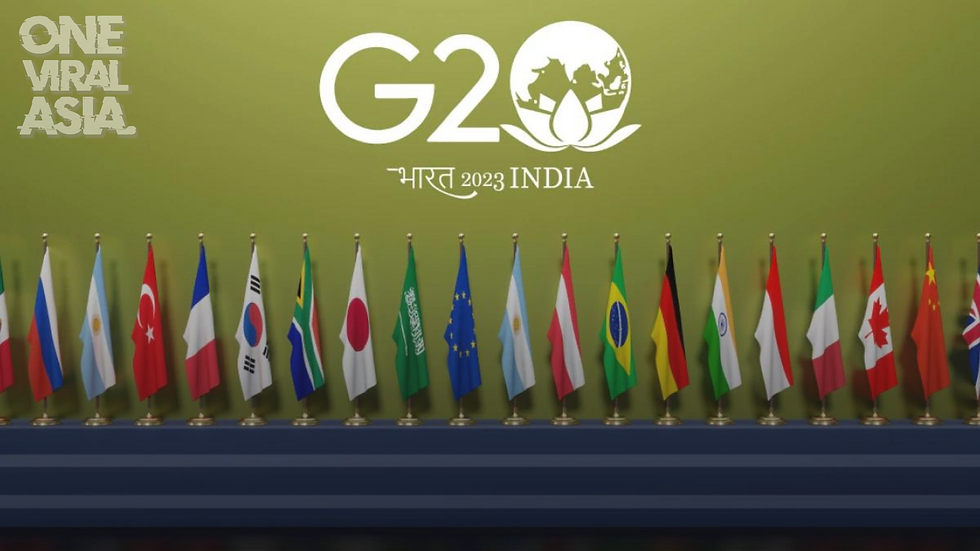Chinese President Xi Jinping's Absence at G20 Summit Signals Complex Geopolitical Dynamics
- One Viral
- Sep 7, 2023
- 3 min read

| 07 September 2023
Chinese President Xi Jinping's decision to skip the upcoming G20 summit in New Delhi has sparked intrigue and raised questions about the state of Sino-Indian relations. Indian Foreign Minister Subrahmanyam Jaishankar, however, has downplayed the significance of this absence, emphasizing that it is unrelated to the ongoing tensions between the two Asian giants.
In a statement to a local news agency, Jaishankar asserted that Xi's absence would not impede negotiations aimed at reaching a consensus communique during the summit, which will convene the world's largest economies this weekend. Beijing has echoed this sentiment, stating that the relationship between China and India remains "generally stable" despite Xi's absence.
The Chinese delegation will be led by Premier Li Qiang, who assumed office in March. Jaishankar noted that "a country's position is obviously reflected by whoever is the representative." While both sides appear keen to minimize the implications of Xi's absence, there are underlying geopolitical factors at play.
One major point of contention between China and India is a longstanding border dispute that flared into a deadly clash three years ago, resulting in casualties on both sides. This dispute continues to fester, with both nations maintaining significant military deployments in the rugged Himalayan region.
Compounding these tensions, India's decision to revoke the semi-autonomous status of Kashmir, parts of which are claimed by China, strained relations further. In May, Beijing notably boycotted the G20 tourism meeting held in Indian-administered Kashmir. Just last month, New Delhi criticized Beijing for including Indian territories in a new Chinese map.
As the G20 summit approaches, India is conducting military exercises near the Chinese border, a move that analysts see as a potential escalation of tensions. Xi's decision not to attend the summit can be seen as a fresh setback to relations between the two Asian giants.
However, there may be broader geopolitical motivations behind Xi's absence. Some experts suggest that it could serve as a signal of China's narrative that "the East is rising, and the West is falling." Additionally, it may be an expression of solidarity with Russian President Vladimir Putin, who is also skipping the summit. Wen-Ti Sung, a political scientist at the Australian National University, believes that this absence can be interpreted within the context of complex global power dynamics.
The Chinese Ministry of Foreign Affairs has refrained from directly addressing the reasons for Xi's absence. Instead, spokesperson Mao Ning emphasized China's continued support for India's hosting of the summit and expressed willingness to work with all parties to ensure its success. Mao assured that China-India relations remain "generally stable" and that dialogue and communication are ongoing.
Frictions between China and India extend beyond the border dispute and encompass trade, technology, investment, and India's deepening ties with the United States. Both nations have expelled each other's journalists, and educational exchanges have dwindled.
The G20 summit itself takes place amid a "very turbulent" global environment, with high expectations for finding solutions to pressing global issues. Nevertheless, the absence of Xi and Putin raises concerns about the ability to reach a consensus on the Leaders Declaration.
Disagreements within the G20 persist on matters such as the conflict in Ukraine and commitments to reduce fossil fuel use and increase renewable energy targets. Russian Foreign Minister Sergey Lavrov, representing Moscow at the summit, has hinted at blocking the final declaration unless it aligns with Russia's position on Ukraine and other crises.
Foreign Minister Jaishankar, however, urged caution in prejudging the summit's outcome, emphasizing that all G20 member nations must recognize their responsibility in setting directions that the world is closely watching.
As the G20 summit unfolds this weekend, the eyes of the world will remain fixed on New Delhi, awaiting not only agreements on global challenges but also signals of the ever-evolving dynamics in international diplomacy.








Comments